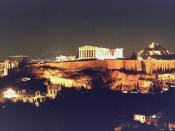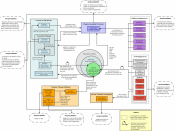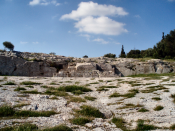Democracy is a form of government in which "the rules of society are decided by the people who will be bound by them" (Janine, Rein, 2004: p4). The word democracy, referring to the "rule of people", was derived from the Greek words demos (people) and kratos (rule). Athens, the most innovative polis or 'city-state' of Ancient Greece was known to be the birthplace of democracy, which lasted during the Athenian "golden age", for about fifty years in the fifth century BCE. The city-state was known for its practice of direct representation in which the citizens directly decided on the laws and policies that would be adopted, ensuring that each and every citizen was represented. The Athenian city-state also introduced trial by jury, attempting to prevent arbitrary prosecution and punishment. In Pericles' Funeral Oration, composed by Thucydides, he stated that, "Our constitution is called a democracy because power is in the hands not of a minority, but of the whole people" (Held, 2006: p13).
However, it was evident that the majority of the Athenian population was not involved in Athenian democracy as many groups were restricted access to political power and influence. At its height, Athens was estimated to dwell 300 000 people, only 40 000 of which were citizens (Janine, Rein, 2004: p4). Citizenry applied exclusively to Athenian free-born male descendants over the age of twenty. The remainder of the population was not eligible for citizenship and thus had no participation in the "Athenian democracy." A portion of the excluded population, involving approximately 30 000 people, was the metics: a class of free non-citizens who played an important role in Athenian society (www.stoa.org, 2003). Yet, they were unable to enjoy the same social, economic, and political rights of an Athenian citizen. Therefore it can be concluded that Athens could not...


